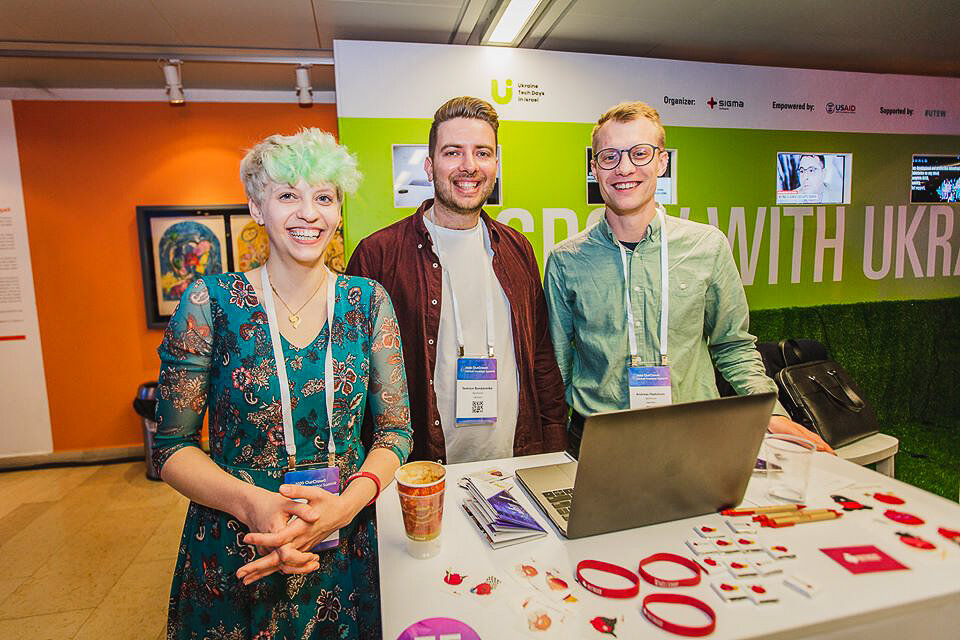As Ukraine continues to wrestle with COVID-19, quarantine restrictions are taking a toll on every Ukrainian industry, including the information technology sector.
But while most businesses from other areas of the economy are losing revenues, cutting salaries and dismissing workers because of the lockdown imposed to stop the spread of the virus, IT hopes to retain its last year’s financial results, losing only in its annual 20-30% growth.
The local tech industry is vital for Ukraine’s economy, securing $5 billion in exports in 2019, the equivalent of 3.5% of Ukraine’s gross domestic product. And it seems that this industry will continue to deliver, as most of the tech specialists are quick to adjust and used to working remotely and investors still seem to trust their money with IT.
And witnessing how Ukraine struggles to sustain its health care amid the COVID-19 pandemic, tech industry players are donating thousands of dollars’ worth of medical equipment.
Switching to living online
Going digital and remote for most tech firms is a matter of habit: the largest share of their clients are always abroad and the sector has long been known for its openness to remote work.
As of April 7, over 92% of Ukraine’s IT companies have switched to working online because of the quarantine restrictions, according to tech community platform DOU.ua — even though tech workers are exempt from the quarantine measures that forbid working from offices.
In fact, many companies have considered working from home even before the quarantine. Tech company Beetroot, for example, had been monitoring the spread of the coronavirus since late February and advising its employees returning from abroad to stay home.
Once Ukraine imposed the quarantine on March 12, everybody stayed home. Now, out of over 400 of the company’s consultants in six Ukrainian cities, 98% are working remotely.
Instead of ordinary Skype calls, the company has launched virtual coffee breaks, online yoga classes, tech meetups and movie screenings. Beetroot CEO Andreas Flodström continues with onboarding presentations for new consultants, but transferred them to an online format, as well.

CEO of Ukrainian-Swedish tech company Beetroot Andreas Flodström (C), the company’s human resources head Anastasiia Khyzhniak and head of business development Semyon Bondarenko pose for a photo that was posted on Facebook on Feb. 20, 2020. (Beetroot/Facebook)
One of the largest Ukrainian IT companies, Genesis, also instructed its employees – 1,200 people – to work from home, even though the Kyiv-based company hadn’t worked in full-scale remote mode before.
As the quarantine began, Genesis invested in the home offices of its employees, supplying them with chairs, computers and even notebooks and books if needed.
Senior staffers are constantly in touch with the rest of the team via video and messaging apps like Skype, Discord and Telegram, ready to help and give emotional support, Genesis spokesperson Olga Shapovalova says.
“While working from home, you can accomplish even more (than usual), but need to spend extra time explaining the tasks to others,” Shapovalova said.
Investors keep investing
In 2019, Ukraine’s tech sector attracted a record-breaking $544 million in funding with 77% of it raised by three tech companies with Ukrainian roots: Grammarly, GitLab, and People.ai. And despite the pandemic, Ukraine-born startups like these continue to attract investors.
Over the last three months, from February to April, five Ukraine-related startups — including Skyworker, Allset and Preply — have raised around $25 million. Revolut, a British fintech startup with a Ukrainian co-founder, attracted $500 million more.
Online tutoring marketplace Preply, which raised $10 million on March 30, hasn’t just retained its users during the quarantine period – it has multiplied them as more and more people trapped at home during the quarantine started taking up online courses, learning languages and improving other skills. Preply has seen a surge in the number of students and tutors registering on the platform.
In the first few weeks of the quarantine, the company has witnessed a nearly two-fold increase in the number of new students in France, Germany, Spain and the U.K. The number of registered tutors in these countries has also increased, Preply stated.
“We are optimistic that online language learning will thrive in the era of social distancing,” Justin Wiggins, executive assistant of the Preply CEO, told the Kyiv Post.
Startup Allset, which has developed a mobile app helping over 2,500 U.S. restaurants cut dining time in half by allowing customers to pre-order meals, also attracted funding during the quarantine. On March 31, Allset raised $8.2 million, bringing its total funding to $16.6 million.
Since the beginning of the quarantine, the amount of orders made through the startup’s service has dropped by 60%, but it bounced back by 10% after Allset added to its database over 200 new restaurants that are based in suburbs rather than city centers.
With the rising demand for takeout food, Allset was one of the first apps to launch a safe no-contact pickup option in the U.S., the company’s head of content, Dimitri Nikulin, told the Kyiv Post.
Taking care of employees
But not all is rosy in IT.
Amid the coronavirus pandemic, the number of vacancies in Ukraine’s IT sector has decreased by 47% compared to the same period last year, Ukrainian job search engine Jooble said in a statement sent to the Kyiv Post on April 22.
The shrinking of the economy has undermined the whole supply chain and had “an immediate impact on tech companies and IT developers,” said Vitaly Sedler, CEO of Ukrainian software engineering company Intellias.
To preserve its current talent pool of 1,500 staffers, Intellias has devised a so-called social security plan for unemployment.
The company reduced wages by 5% for specialists and 10% for management. Sedler has given up his entire salary for the time of the crisis in a bid to finance a reserve fund that will keep engineers whose projects were cancelled on staff until they can be assigned to a new one.
“This is a social approach,” Sedler said.
Helping fight COVID-19
Despite financial difficulties, the Ukrainian tech industry seems generous. Many IT firms have decided to donate money to provide hospitals with diagnostic and protective equipment or to develop free online services for citizens to get through the pandemic more easily.
Genesis, for example, has invested over Hr 400,000 ($15,000) to buy respirator masks and protective costumes for medical workers. The company has also been allocating money to foundations and hospitals to support them amid the pandemic.
IT company MacPaw, in turn, bought five lung ventilators and 2,000 protective costumes for doctors. The firm cooperates with volunteers and has donated money to lighting company Expolight to illuminate St. Nicholas Roman Catholic Cathedral in Kyiv in red and white to remind people about the doctors working on the front line of the pandemic.

St. Nicholas Roman Catholic Cathedral in Kyiv is illuminated in red and white to remind people about the medical workers who continue doing their job during the COVID-19 pandemic. The lights were installed by lighting company Expolight, and the project was supported financially by tech firms MacPaw, Ring Ukraine and SD Capital, as well as by business center Toronto-Kyiv Complex. (MacPaw/Facebook)
Intellias also works with volunteers and has recently bought 10,000 rapid COVID-19 tests. The company aims to invest in testing to help detect the virus in the early stages.
Apart from donations, tech companies have been developing free online tools that are supposed to help people weather the quarantine. InDevLab, in partnership with mobile operator Kyivstar, has developed an app called Doctor Online. It provides free online consultations from qualified doctors to more than 1,000 people daily. Seventy doctors volunteered to provide users with nutrition and psychological assistance, according to company CEO Maria Prokhorova.
Beetroot, meanwhile, has transferred all the programming lessons it provides via its Beetroot Academy online. This allows users to obtain hands-on experience from IT professionals without leaving their homes.
“For Academy, it is not an easy period,” Beetroot CEO Andreas Flodström said, “but we have nearly 500 students and it does not let us give up.”
